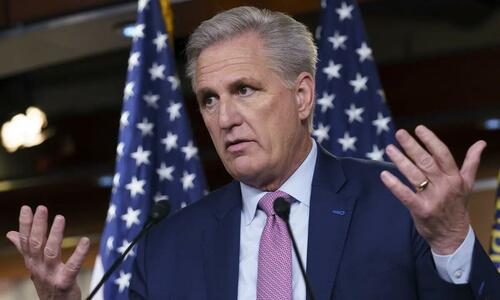
In an 11th hour Hail Mary in the hopes of averting a government shutdown, House Speaker Kevin McCarthy (R-CA) announced that the only way the House will pass a Continuing Resolution (CR) to fund the government through October is to drop Ukraine funding.
"I think if we had a clean one without Ukraine on it, we could probably be able to move that through," McCarthy told CNN's Manu Raju.
The comment comes hours after McCarthy lost a game of chicken with the House Freedom Caucus, failing to pass a CR which left McCarthy will few options to try and avert a shutdown in less than 36 hours. McCarthy was hoping that the House bill's border security provisions would win over enough holdouts to pass.
Meanwhile, the White House slammed the failed bill over the 'elimination of 12,000 FBI agents,' and 'almost 1,000 ATF agents.'
White House budget director:
— Townhall.com (@townhallcom) September 29, 2023
Republicans’ bill “would eliminate 12,000 FBI agents, almost 1,000 ATF agents!” pic.twitter.com/y5ymbTIDYM
Of note, House Republicans on Thursday narrowly passed the annual defense spending bill, but only after they removed $300 million in Ukraine aid from the legislation (which then cleared in a separate vote because a bunch of Democrats then voted).
Speaker Kevin McCarthy, who failed twice last week to advance the bill to the floor, finally locked down enough Republican votes to pass the bill after the House stripped $300 million to arm Ukraine from the text.
The separate bill carved out to allocate those funds for Kyiv passed Thursday in a 311-117 blowout bipartisan vote. Republicans had won a close procedural vote earlier in the day to separate the Ukraine money from the Pentagon bill, a move meant to flip a handful of GOP holdouts. -Politico
Democrats framed the optics as Kremlin-friendly, with House Armed Services ranking Democrat Adam Smith saying "The Russians are good at propaganda... It will be played as America backing off of its commitment for Ukraine."
Republicans responded that by carving Ukraine out of the defense bill, it allows opponents of either measure (Ukraine aid or the defense bill) to voice their opinions on each independently.
"Why don’t we make sure this gets through? I mean, I’m just mystified that this is somehow a problem," said House Rules Chair Tom Cole (R-OK), according to Politico. "We guarantee you something you want is going to pass the House and you’re upset about it."
And now, McCarthy says there's no way to avert a government shutdown unless the House, and the Senate, agree to nix Ukraine aid from the 30-day stopgap.
Fire and Brimstone...
On Friday, White House top economic adviser Lael Brainard said that a shutdown would pose an "unnecessary risk" to what he described as a resilient economy with moderating inflation.
Treasury Secretary Janet Yellen then chimed in, warning that all of Bidenomics could be negatively impacted.
"The failure of House Republicans to act responsibly would hurt American families and cause economic headwinds that could undermine the progress we’re making," Yellen said from Port of Savannah, Georgia, adding "A shutdown would impact many key government functions from loans to farmers and small businesses, to food and workplace safety inspections, to Head Start programs for children.
"And it could delay major infrastructure improvements."
Goldman has predicted that a shutdown will last 2-3 weeks, and that a 'quick reopening looks unlikely as political positions become more deeply entrenched.' Instead, as political pressure to reopen the government builds, pay dates for active-duty military (Oct. 13 and Nov. 1) will become key dates to pay attention to.
In addition, they think a shutdown could subtract 0.2pp from Q4 GDP growth for each week it lasts (adding the same to 1Q2024, assuming it's over by then).
What's more, all data releases from federal agencies would be postponed until after the government reopens.
More via Goldman:
What are the odds the government shuts down?
A shutdown this year has looked likely for several months, and we now think the odds have risen to 90%. The most likely scenario in our view is that funding will lapse after Sep. 30, leading to a shutdown starting Oct. 1. That said, a short-term extension cannot be entirely ruled out. In the event that Congress avoids a shutdown starting Oct. 1, we would still expect a shutdown at some point later in Q4.
While there is likely sufficient support in both chambers of Congress to pass a short-term extension of funding—this is known as a “continuing resolution” (CR)—that is “clean” with no other provisions attached, the majority of that support would come from Democrats. The Senate is considering a CR that includes aid for disaster relief and Ukraine. House Republican leaders are under political pressure to pass a CR that includes Republican policy priorities that can pass with mainly or exclusively Republican support. At the moment, neither chamber looks likely to pass the other chamber's CR.
The outlook seemed bleak ahead of the debt limit deadline earlier this year, but Congress resolved it in time; why shouldn’t we expect a last-minute deal once again?
The smaller economic hit from a shutdown puts less pressure on Republican leaders to override the objections of some in their party to reach a deal. Ahead of the debt limit deadline earlier this year, Republican leaders reached a deal over the objections of some in their party because the potential hit to the economy from an impasse would have been unpredictable and severe, and even lawmakers most strongly opposed to a compromise agreed that the debt limit must be raised. By contrast, the economic hit from a shutdown would be smaller and more predictable, as there have already been two protracted shutdowns over the last decade. While most lawmakers on both sides of the aisle would prefer to avoid a shutdown, both sides appear more willing to take the chance it occurs.
* * *
Stay tuned...
In an 11th hour Hail Mary in the hopes of averting a government shutdown, House Speaker Kevin McCarthy (R-CA) announced that the only way the House will pass a Continuing Resolution (CR) to fund the government through October is to drop Ukraine funding.
“I think if we had a clean one without Ukraine on it, we could probably be able to move that through,” McCarthy told CNN‘s Manu Raju.
The comment comes hours after McCarthy lost a game of chicken with the House Freedom Caucus, failing to pass a CR which left McCarthy will few options to try and avert a shutdown in less than 36 hours. McCarthy was hoping that the House bill’s border security provisions would win over enough holdouts to pass.
Meanwhile, the White House slammed the failed bill over the ‘elimination of 12,000 FBI agents,’ and ‘almost 1,000 ATF agents.’
White House budget director:
Republicans’ bill “would eliminate 12,000 FBI agents, almost 1,000 ATF agents!” pic.twitter.com/y5ymbTIDYM
— Townhall.com (@townhallcom) September 29, 2023
Of note, House Republicans on Thursday narrowly passed the annual defense spending bill, but only after they removed $300 million in Ukraine aid from the legislation (which then cleared in a separate vote because a bunch of Democrats then voted).
Speaker Kevin McCarthy, who failed twice last week to advance the bill to the floor, finally locked down enough Republican votes to pass the bill after the House stripped $300 million to arm Ukraine from the text.
The separate bill carved out to allocate those funds for Kyiv passed Thursday in a 311-117 blowout bipartisan vote. Republicans had won a close procedural vote earlier in the day to separate the Ukraine money from the Pentagon bill, a move meant to flip a handful of GOP holdouts. –Politico
Democrats framed the optics as Kremlin-friendly, with House Armed Services ranking Democrat Adam Smith saying “The Russians are good at propaganda… It will be played as America backing off of its commitment for Ukraine.”
Republicans responded that by carving Ukraine out of the defense bill, it allows opponents of either measure (Ukraine aid or the defense bill) to voice their opinions on each independently.
“Why don’t we make sure this gets through? I mean, I’m just mystified that this is somehow a problem,” said House Rules Chair Tom Cole (R-OK), according to Politico. “We guarantee you something you want is going to pass the House and you’re upset about it.”
And now, McCarthy says there’s no way to avert a government shutdown unless the House, and the Senate, agree to nix Ukraine aid from the 30-day stopgap.
Fire and Brimstone…
On Friday, White House top economic adviser Lael Brainard said that a shutdown would pose an “unnecessary risk” to what he described as a resilient economy with moderating inflation.
Treasury Secretary Janet Yellen then chimed in, warning that all of Bidenomics could be negatively impacted.
“The failure of House Republicans to act responsibly would hurt American families and cause economic headwinds that could undermine the progress we’re making,” Yellen said from Port of Savannah, Georgia, adding “A shutdown would impact many key government functions from loans to farmers and small businesses, to food and workplace safety inspections, to Head Start programs for children.
“And it could delay major infrastructure improvements.”
Goldman has predicted that a shutdown will last 2-3 weeks, and that a ‘quick reopening looks unlikely as political positions become more deeply entrenched.’ Instead, as political pressure to reopen the government builds, pay dates for active-duty military (Oct. 13 and Nov. 1) will become key dates to pay attention to.
In addition, they think a shutdown could subtract 0.2pp from Q4 GDP growth for each week it lasts (adding the same to 1Q2024, assuming it’s over by then).
What’s more, all data releases from federal agencies would be postponed until after the government reopens.
More via Goldman:
What are the odds the government shuts down?
A shutdown this year has looked likely for several months, and we now think the odds have risen to 90%. The most likely scenario in our view is that funding will lapse after Sep. 30, leading to a shutdown starting Oct. 1. That said, a short-term extension cannot be entirely ruled out. In the event that Congress avoids a shutdown starting Oct. 1, we would still expect a shutdown at some point later in Q4.
While there is likely sufficient support in both chambers of Congress to pass a short-term extension of funding—this is known as a “continuing resolution” (CR)—that is “clean” with no other provisions attached, the majority of that support would come from Democrats. The Senate is considering a CR that includes aid for disaster relief and Ukraine. House Republican leaders are under political pressure to pass a CR that includes Republican policy priorities that can pass with mainly or exclusively Republican support. At the moment, neither chamber looks likely to pass the other chamber’s CR.
The outlook seemed bleak ahead of the debt limit deadline earlier this year, but Congress resolved it in time; why shouldn’t we expect a last-minute deal once again?
The smaller economic hit from a shutdown puts less pressure on Republican leaders to override the objections of some in their party to reach a deal. Ahead of the debt limit deadline earlier this year, Republican leaders reached a deal over the objections of some in their party because the potential hit to the economy from an impasse would have been unpredictable and severe, and even lawmakers most strongly opposed to a compromise agreed that the debt limit must be raised. By contrast, the economic hit from a shutdown would be smaller and more predictable, as there have already been two protracted shutdowns over the last decade. While most lawmakers on both sides of the aisle would prefer to avoid a shutdown, both sides appear more willing to take the chance it occurs.
* * *
Stay tuned…
Loading…





